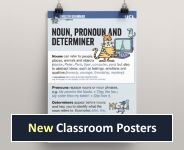Conjunctions: Conjunctions and ambiguity
Look at this sentence:
- Can I have cheese and tomato sandwiches for lunch?
Do you think the speaker wants sandwiches filled with cheese and tomato or some cheese, and sandwiches with a tomato filling?
Native speakers probably know what cheese and tomato sandwiches are, but they don't realise that the phrase is actually ambiguous (has more than one meaning).
Welcome back!

Englicious is totally free for everyone to use!
But you will have to log in to see our library of teaching resources.
If you don’t have an account, that’s perfectly OK. You can register (for free).
It only takes a minute or two.
»
- Printer-friendly version
- Log in to view or leave comments

